« March 2007 | HOME PAGE | May 2007 »
April 29, 2007
Urumqi to New York, via Istanbul
There were several reports floating around over the past couple weeks about China's plans to seriously develop the roads heading west out of Xinjiang towards Central Asia and Eastern Europe. Most of those reports were written in a bureaucratic press-release style (a la Xinhua), so I didn't get around to posting them here. The South China Morning Post has finally gotten around to thoroughly analyzing the proposed new routes, the most exciting of which is a 5,000 km road link to Istanbul:
Some 95 per cent of Chinese exports currently go by sea. Poor transport links - rutted, narrow, clogged roads - mean that even goods originating in Xinjiang are typically transported 4,000km across China by rail before being loaded onto ships.
The government's plans to improve Xinjiang's road network and develop Urumqi into a modern logistics hub for Central Asia make sound economic - and environmental - sense. The total distance of shipping goods from Urumqi to Hamburg via Shanghai's seaport is over 24,000km, compared with 6,750km overland via Moscow.
One of the more ambitious plans being touted is for the Silk Road to become an alternative conduit for Chinese exports to the United States. Cargo destined for the east coast seaboard would be trucked to ports in the Black Sea and then shipped directly, nearly halving the distance of shipping via the Pacific west coast.
You can read the full article below.
New Silk Road to link Beijing, Black Sea
Tom Miller in Beijing
27 April 2007
South China Morning Post
Since the dissolution of the Soviet Union in 1991, China's border trade with the newly independent states of Central Asia has flourished. But a combination of poor roads and excessive customs restrictions had foiled plans to reopen the ancient Silk Road as a commercial land bridge between China and Europe.
But recent infrastructure improvements and impending moves to streamline cross-border customs procedures mean that a modern Silk Road, linking businesses from Beijing to the Black Sea, will soon become a commercial reality.
This month China announced it was building 12 highways in northwest Xinjiang that will connect with roads in Russia, Kazakhstan, Kyrgyzstan and Pakistan, linking China to international trade routes running through Central Asia and the Middle East to markets in Europe.
The new roads plug into the UN-supported Asian Highway project, a network of 141,000km of transport arteries criss-crossing 32 Asian countries. The longest highway will stretch 5,000km from Urumqi , capital of Xinjiang, to Istanbul at the entrance to the Mediterranean.
Although around 15 per cent of the roads in the Asian network are currently below minimum standards agreed on by governments taking part in the scheme, pilot "truck caravans" - descendants of the camel trains that once traversed deserts and mountain passes - have successfully made their way from Lisbon to Vladivostok and from Beijing to Berlin in recent years.
Peter Krausz, head of goods transport at the Geneva-based International Road Transport Union, an independent industry association, said: "The infrastructure along the modern Silk Road is pretty much in place. We have already run pilot caravans between Europe and Asia, and now we are fast approaching the commercial phase.
"Commercial operations will start once China joins the UN conventions regulating international road transport - the Transports Internationaux Routiers - which we expect to happen later this year."
The convention reduces unnecessary customs inspections and transport delays by providing transit countries with customs duties guarantees. In theory, a truck beginning its journey in China could be certified by Chinese customs and travel all the way to Europe without having its contents inspected en route.
Currently China is the only country on the old Silk Road not to have ratified the convention, which means that trucks leaving the mainland are often delayed at border crossings.
"We have been looking forward to the introduction of the UN convention in China for a number of years," said Michael Drake, managing director of the Chinese arm of international logistics company TNT. "It is the oil that greases the whole network; without it, international transport becomes extremely difficult."
Logistics providers are excited about the potential time and cost savings of transporting higher value and time-sensitive goods, such as electronics and semiconductors, overland rather than by ship.
"The major impact will be to reduce shipment costs and times of transit from China to Europe by roughly one-third," said Turloch Mooney, managing director of Supply China Asia, an industry community that promotes the development of Asia's logistics sector.
Some 95 per cent of Chinese exports currently go by sea. Poor transport links - rutted, narrow, clogged roads - mean that even goods originating in Xinjiang are typically transported 4,000km across China by rail before being loaded onto ships.
The government's plans to improve Xinjiang's road network and develop Urumqi into a modern logistics hub for Central Asia make sound economic - and environmental - sense. The total distance of shipping goods from Urumqi to Hamburg via Shanghai's seaport is over 24,000km, compared with 6,750km overland via Moscow.
One of the more ambitious plans being touted is for the Silk Road to become an alternative conduit for Chinese exports to the United States. Cargo destined for the east coast seaboard would be trucked to ports in the Black Sea and then shipped directly, nearly halving the distance of shipping via the Pacific west coast.
Trucking goods direct to Europe or shipping goods via the Black Sea would allow exporters to bypass congested ports in Europe and along the west coast of the US.
"The biggest bottlenecks are not in China but in the US, especially Long Beach," said Henrik Olesen, Asia-Pacific logistics leader at IBM Global Business Services.
Increased overland trade would not replace a significant proportion of ship trade and "there will be no negative impact on trade shipped out of ports like Shanghai", he added.
Mr Krausz said: "The Silk Road route will not and never was intended to overtake the leading role of ship transport.
"In tonnes, it will not have any significant impact on the shipping lines. But the value of goods transported by road will be high relative to the total value of Chinese exports - perhaps as high as 20 per cent within 20 years."
A reinvigorated land bridge between Asia and Europe also means valuable trade links with the resource-rich countries of Central Asia, which China is keen to draw further into its economic orbit.
posted April 29, 2007 at 05:52 PM unofficial Xinjiang time | Comments (27)
April 23, 2007
Behold, Mother Nature's Fury!
How much sand could a sandstorm storm if a sandstorm could storm sand?
Well, I received quite a vivid and colorful answer yesterday morning as I was preparing to leave Korla for a quick business trip to Kasghar. My newly-organized perch high over Korla gives me the perfect vantage point for observing the effect of a brisk wind on trillions of microscopic particles of sand from the Taklamakan Desert.
This first photo was taken at 9:24am, when I awoke to find the air above the city as clear as I've ever seen it:
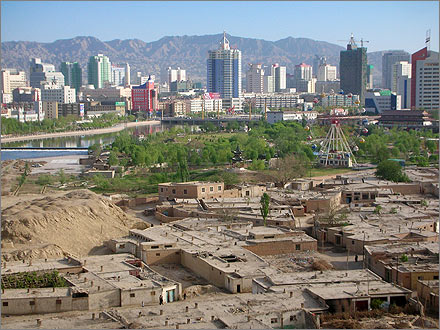
Things changed rather quickly when the wind kicked up. This second photo was taken at 9:35am, only 11 minutes later:
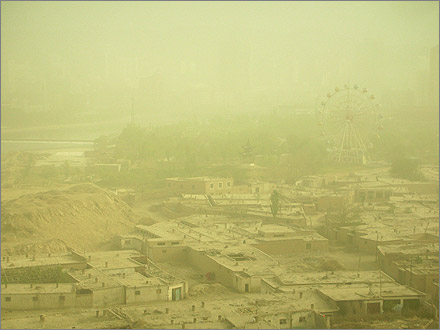
I don't think any words of wisdom I could add here would speak any louder than the photos above. Sandstorms are just one of the small pleasures of living next door to one of the world's largest sandboxes.
posted April 23, 2007 at 03:55 PM unofficial Xinjiang time | Comments (56)
April 16, 2007
Must.. Create... a New Entry!
Sheesh! Just when I'm about to finally complete a new blog entry Microsoft's new version of IE has to poop out on me. Thanks a lot, Bill Gates. Well, here's another try...
I've finally returned to Korla after journeys on both sides of the Pacific. The six weeks back in the good ol' US of A were rejuvinating and the two weeks spent traveling down the east coast of China with my mother were surprisingly fun. I mean, don't take offense, Mom... but we could've gotten on each others nerves and made a mess of the whole thing. In any case, thanks for paying!
I don't have the energy to describe the whole trip: Beijing, Shanghai, Suzhou & Zhouzhuang, the Yellow Mountains, and Hong Kong. So, instead of blabbering away about places many of you have visited yourselves, I'll just post a few random images and be done with it! These pictures aren't meant to be an account of the journey, just a few interesting visual moments to get the neurons firing. Put your cursor over each picture for a short caption:


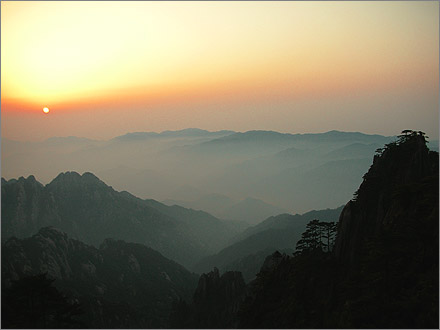
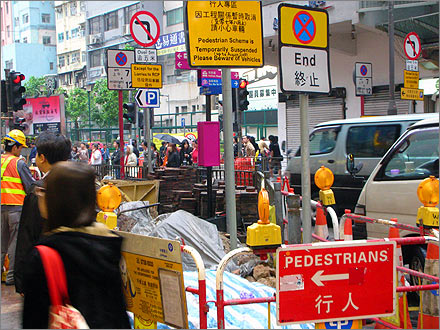
When I get around to it, I'll be adding more photos to the gallery. What else, what else? Ah yes, a pertinent quote from Steinbeck's East of Eden, which I'm currently reading:
When two men live together they usually maintain a kind of shabby neatness out of incipient rage at each other. Two men alone are constantly on the verge of fighting, and they know it.
And so, after many years of living with roommates, I've finally decided to get a place of my own. Alone for the first time... (sigh). Of course it has something to do with the fact that my current flatmate is moving to Shanghai and I can't think of anyone else to live with in Korla. I've also decided that rather than practical factors like floor space and amenities, I simply want a place with a great view. Thus, I've found an outrageously expensive (for Korla) studio apartment with a window overlooking what I think is the best scenery in town:
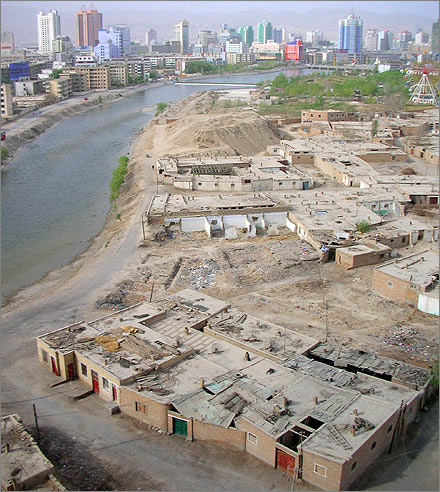
Anyone wanna place bets on which buildings in the photo above won't be standing in one or two years? Still, I like the contrast of old and new. Plus, my favorite Uyghur pool (the kind with balls) spot is just around the corner.
I'm told that the ladies will find my new apartment romantic, and that the river view will ensure a great flow of wealth into my life over the next year. A guy can hope, can't he? Now I'll just have to figure out where to store all of my crap!
posted April 16, 2007 at 05:14 PM unofficial Xinjiang time | Comments (33)
April 02, 2007
Sorry
Sorry to all for the lack of posts lately. After a long sojourn in New Jersey, I'm currently spending two weeks traveling down the eastern coast of China with my mother. I'll be back in Xinjiang sometime mid-month, and I promise to return to my previous good form! Thanks for your patience.
posted April 02, 2007 at 08:50 PM unofficial Xinjiang time | Comments (26)
